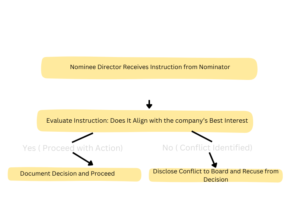
Roles, Responsibilities, and Liabilities of Nominators and Nominee Directors in Malaysia
The roles of nominators and nominee directors are critical in the corporate governance landscape, particularly under Malaysia’s Companies Act 2016. Understanding their responsibilities and potential liabilities is essential for maintaining compliance and ensuring effective corporate governance.
Who is a Nominator?
A nominator is an individual or entity that appoints a nominee director to represent their interests on the board of a company. Nominators are typically major shareholders, creditors, or parent companies who seek to influence the company’s decisions through their appointed director.
Role and Responsibilities of Nominators
- Influence Without Direct Control: Nominators seek to exert influence over the company’s operations and decisions through their nominee director, without being directly involved in day-to-day management.
- Ensuring Compliance: Nominators must ensure that their appointed nominee director complies with all legal obligations, including acting in the best interest of the company, not just the nominator.
- Communication and Coordination: Effective communication between the nominator and the nominee director is crucial. The nominator should provide guidance while allowing the director to make decisions that align with the company’s interests.
Who is a Nominee Director?
A nominee director is appointed by the nominator to represent their interests on the board. However, despite their loyalty to the nominator, they are legally bound to act in the best interest of the company as a whole.
Responsibilities of Nominee Directors
- Fiduciary Duty to the Company:
- Primary Loyalty: Nominee directors must prioritize the company’s welfare over the nominator’s interests. Their decisions should benefit the company and its shareholders.
- Exercise of Independent Judgment: They must use their judgment independently, even when their decisions might conflict with the nominator’s desires.
- Duty of Care, Skill, and Diligence:
- Nominee directors are required to stay informed, attend board meetings regularly, and make decisions based on accurate information.
- Avoidance of Conflicts of Interest:
- Any potential conflicts between the interests of the nominator and the company must be disclosed, and the director should recuse themselves from related decisions.
Liabilities of Nominators
- Indirect Liability: While nominators are not directly liable for the actions of the nominee director, they could face reputational damage or indirect consequences if their nominee director engages in misconduct or breaches their fiduciary duties.
- Legal Consequences: If the nominee director’s actions are found to be in breach of the law, particularly if directed by the nominator, the nominator may also be implicated in legal proceedings.
Liabilities of Nominee Directors
- Personal Liability: Nominee directors can be held personally liable for any actions that breach their fiduciary duties or that result in financial loss to the company due to negligence or misconduct.
- Reputational Risks: Involvement in legal disputes or governance failures can severely damage a nominee director’s reputation, affecting their future career prospects.
- Financial Penalties: The Companies Act 2016 imposes fines and other penalties on directors who fail to fulfill their legal duties, including nominee directors.
Decision-Making Process for Nominee Directors
Conclusion
The relationship between nominators and nominee directors is intricate, balancing the interests of the nominator with the legal obligations of the director. Both parties must navigate their roles with care, ensuring that decisions benefit the company as a whole. Understanding the responsibilities and potential liabilities associated with these roles is crucial for maintaining compliance and protecting all involved from legal risks.
By adhering to best practices and maintaining transparency, nominators and nominee directors can effectively contribute to the company’s success while safeguarding their interests and reputations.

